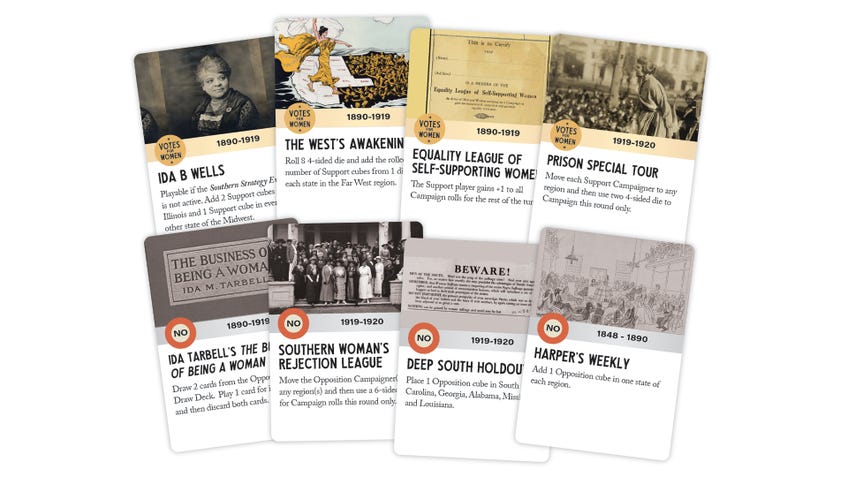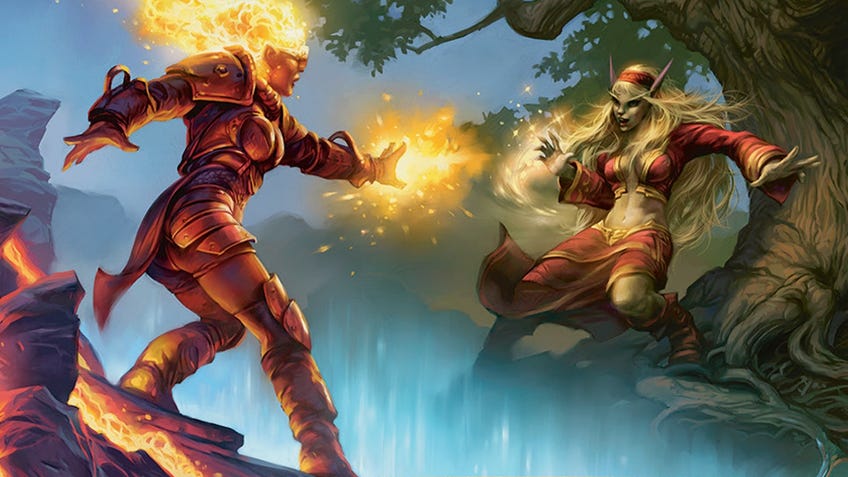What are you playing this weekend? Here’s what we’ve been playing!
From real history to great fiction.
It’s been a busy ol’ week here at Dicebreaker, but that doesn’t mean we haven’t been playing any tabletop games. Judging by this week’s What You've Been Playing, nothing could be further from the truth actually. The latest edition of this weekly series is packed-full of some fantastic thoughts on a wide variety of fantastic games.
From the strange world of horror tabletop roleplaying game Deadlands: The Weird West, to the streets of 19th/18th century USA, to Victorian Britain and even the vast worlds of Magic: The Gathering, this entry of What You've Been Playing goes all over the place. You’ll find entries about TRPGs, board games and trading card games in this article - so, there’s pretty much something for everyone here.
If you’ve been playing anything interesting, please do let us know in the comments below or tweet at us @joindicebreaker, as we’d love to hear from you.
What We’ve Been Playing - May 12th 2023
Deadlands: The Weird West

After some COVID-related delays (on top of the classic Group RPG Calendar Dilemma), my Deadlands posse and I rode back into the dusty, supernatural plains of the Weird West this week for a fairly epic five-hour odyssey.
Having previously unionised a riverful of drowned, living corpses, then unionised our party’s travelling circus - including one bullet-ridden undead gunslinger, a preacher and a mule with a love of maths - then blasted a mysterious lightning bird out of the sky after it swallowed a friendly crowd of ghosts, it was time for our group to finally move on from the town of Helena, Montana. (Truly the best of both worlds.)
Our possible quest threads coalesced into a trip down to Salt Lake City in search of one of the group’s missing husbands. After a taste-test of the lightning bird - risk-free, thanks to my hallowed’s staunch refusal to die to either bullets or Bad Eatin’ - we discovered that the meat would turn us invisible for a few minutes. Handy if you’re, say, a group of roleplayers. A few hours of cuttin’-and-dryin’ later, we were laden with more invisible bird jerky than anyone could be bothered to track on a character sheet.
The rest of the bird went to a local trader, who opted to follow us along our journey with the promise of future supernatural zoology. Down the trail, we came across our next target: a giant red coyote. Before we could do much, though, the coyote was scared off by a mysterious stranger, who quickly turned their hand to extorting us for our apparent protection.
Shoots soon rang out, with some unfortunately high rolls - helped along by Deadlands’ use of exploding results on the highest numbers - overdoing a simple warning shot and leaving the stranger dead.
I’m a noted admirer of Deadlands’ Savage Worlds system, with its equal love of every die in the polyhedral pantheon - from d4 to d12 (discounting the d20, which gets enough love) - and their relation to characters’ skills offering a far more tangible way of depicting characters’ varying ability levels. Exploding dice results are another favourite of mine that too few games use, with the potential to have even the lowest die rack up an enormous total leaving a delightful bit of tension and chaos in every situation - as our unfortunate interloper discovered.
Combat, too, is a stark change from the likes of D&D, with characters and NPCs quickly eliminated by a couple of wounds, rather than soaking up dozens of hit points like a grotty blood-soaked sponge. Attacks happen quickly and result in fairly major damage, making it the perfect fit for the fast-draw, pistol-blasting setting of the Weird West.
Deadlands remains a top-notch game, and one I’m always excited to return to. Hopefully next time we can roll just a little bit *less* well.
Matt
Votes for Women

Historical board games can carry a particular stink of elitism about them - folks, myself included, tend to imagine them as either baroque Napoleonic reenactments where nothing comes before strict adherence to ‘how it actually happened’, or they’re a patronising hodge podge of rules thinly covering a secondary school lesson.
I’m happy to report that Fort Circle Game’s Votes For Women is neither. Instead, this board game centred on the American women's suffrage movement translates a thorny and convoluted period of radical change into a one-on-one competitive race to pass a constitutional amendment with heart, thoughtfulness and, most surprising, great fun.
One player will take up the fight for suffrage, while the other has the onerous task of opposing women’s right to vote. Each will take turns playing cards from a deck split between the early, middle and late periods of the 1800s and 1900s. Most cards focus on placing cubes amongst US states, representing support for - or against - the 19th amendment.
At the same time, both players are jockeying for control of congressional support, represented by six white pylons. Once those fill up and Congress takes the amendment to an official vote, each state with four or more cubes immediately locks its vote. The rest go to a die roll that, at least in my session against Matt Jarvis, came down to a nail-biting final roll.
Votes for Women excels at loosely but accurately representing how the geography and various political regions of the US affected support for what was then a major sociopolitical issue. Matt easily locked down the South, while I took early control of the West Coast and Great Plains regions - where the suffrage movement found its start. The meat of the game’s six rounds found us fighting bitter battles everywhere else as cards depicting both famous suffrage leaders and patriarchal senators whipped around cubes like the tide.
Along the way, Matt admitted that even a British lad with only the barest hint of American history could understand the narrative behind this historical period, and that’s why I think Votes for Women is worth checking out, even for those allergic to this genre. The mechanics empower both players to tell a compelling story based on real events without forgetting that games are meant to be enjoyed.
Chase
Jekyll vs. Hyde

This week, Mr Jarvis and I ventured into Board Game Arena in search of some good two-player board games and found Jekyll vs. Hyde. A card game based on the classic Robert Louis Stevenson novella, Strange Case of Dr Jekyll and Mr Hyde, Jekyll vs. Hyde was immediately arresting thanks to its striking artwork - which was illustrated by Vincent Dutrait, who has also worked on the most recent edition of Jaipur.
In Jekyll vs. Hyde, players take on the roles of either the titular Doctor or his terrifying alter-ego, as the two struggle to assume control of the body they share. This struggle plays out in the game through a series of ‘tricks’, or turns within a round that see players laying down cards of varying suits. Whichever type of card is played becomes the lead suit, with the other player needing to lay down a card of the same suit if they can. Whoever plays the highest numbered card of the lead suit wins the trick, unless they play a card of a suit that is classed as being stronger.
Herein is where Jekyll vs. Hyde injects the trick-taking genre with its own unique little twist, as suits will have different strengths depending on what order they were first played in. The first suit to be played in each round of Jekyll vs. Hyde will become the weakest suit, whilst the last will be the strongest. This means that players will need to think carefully about which suits to lead with and remember what cards have already been played, as each suit will contain a total of seven cards.
Besides the three main colour suits, players will also be able to play special potion cards that will either match the lead suit or can be any suit of the player’s choosing if they lead with it. This means that players can win or lose tricks even if they do not have a card matching the suit they want to play. Potions will also trigger unique abilities depending on the colour they played with, giving players an additional advantage.
Rather than wanting to win every single trick, players will have to decide whether they will try to win or lose a current trick depending on the score. Besides its suit strength system, Jekyll vs. Hyde’s other little trick-taking twist is that each player has a different win condition depending on their role.
The game features a board tracking the current state of Dr Jekyll’s mind, with the tracking token beginning in the furthest place towards Dr Jekyll’s control. However, at the end of every round the token will move towards Mr Hyde’s side based on the difference between the players’ scores, regardless of who is winning. This means that whilst Dr Jekyll will want to keep the scores as balanced as possible, Mr Hyde wants disparity - no matter if they have the most wins or not.
This gameplay mechanic makes the pacing of playing Dr Jekyll vs. Mr Hyde undeniably engaging because it’s more about controlling the ebb and flow of each round. Deciding what to play on what turn will change entirely depending on the current score, which keeps an otherwise simple gameplay loop fresh and exciting.
I absolutely love little trick-taking games like this, as well as Fox in the Forest, as I’ve always enjoyed the basic format of the genre and love discovering new ways it can be played around with. If you, too, enjoy trick-taking card games, I can fully recommend Dr Jekyll vs. Mr Hyde.
Meehan
Magic the Gathering Commander & Arena

This is just a little note from me (because sometimes I straight up forget to play things) to say I’m really enjoying Dicebreaker’s foray into more Magic the Gathering content - speaking from the video team anyway! We’re playing a lot more, particularly Magic’s Commander mode. I also keep surprising myself because I’m actually winning some of our games.
Of course Magic can be very luck-of-the-draw, but I do find myself grasping how a deck is meant to be played pretty quickly. Unless it says something about ‘proliferating’ - I haven’t gotten my head around that yet but I’ll get there!
I know that our team is very lucky in that we have a lot of access to TCG cards but I will say that Magic the Gathering Arena has been super helpful to me in terms of just getting my head around some of Magic’s more finite concepts. I highly recommend checking it out if you think the TCG might be a bit too overwhelming to take on head first. You can even devise a deck in Arena and then transfer that over to your physical deck.
It’s just something I find really handy during my current learning process. (It does help that I’ve had Magic pros Chase and Wheels on hand too).
My next goal is to make my very own deck that makes someone swear in horror.
Liv



